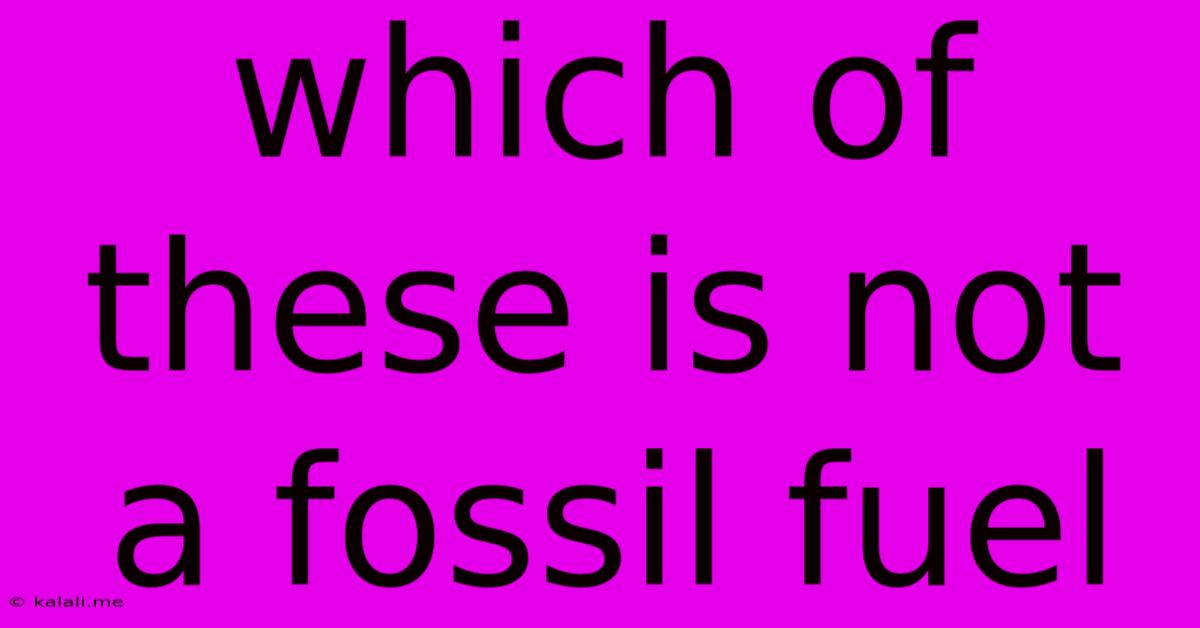Which Of These Is Not A Fossil Fuel
Kalali
Jun 15, 2025 · 2 min read

Table of Contents
Which of These Is Not a Fossil Fuel? Understanding Energy Sources
Fossil fuels are a significant part of our global energy landscape, powering transportation, electricity generation, and countless industrial processes. But what exactly are they, and which of the following isn't one: coal, natural gas, solar energy, and petroleum? This article will delve into the definition of fossil fuels and clarify which option doesn't belong.
What are Fossil Fuels?
Fossil fuels are hydrocarbons formed from the remains of prehistoric organisms – plants and animals – that lived millions of years ago. Over immense periods, these organic materials were subjected to intense heat and pressure deep beneath the Earth's surface. This process transformed them into the energy-rich substances we know today. The three main types are:
- Coal: Formed from ancient plant matter in swamps and bogs.
- Petroleum (crude oil): Formed from microscopic marine organisms.
- Natural Gas: Primarily methane, often found alongside petroleum deposits.
These fuels are non-renewable resources, meaning they are finite and take millions of years to form, making their depletion a serious concern. Their combustion releases greenhouse gases, significantly contributing to climate change.
Identifying the Non-Fossil Fuel
Now, let's look at the options provided: coal, natural gas, solar energy, and petroleum. As discussed, coal, natural gas, and petroleum are all undeniably fossil fuels.
Solar energy, however, is fundamentally different. It's a renewable energy source, harnessed from the sun's radiant energy. Unlike fossil fuels, solar energy is constantly replenished and doesn't rely on the decomposition of ancient organisms. It's a clean energy alternative, producing no greenhouse gas emissions during operation. Solar panels convert sunlight directly into electricity, or solar thermal systems use sunlight to heat water or air.
Why the Distinction Matters
Understanding the difference between fossil fuels and renewable energy sources like solar power is crucial for several reasons:
- Environmental Impact: Fossil fuels contribute to air and water pollution and climate change. Renewable sources are far cleaner and sustainable.
- Resource Availability: Fossil fuels are finite; renewable sources are practically limitless.
- Energy Security: Reliance on fossil fuels can lead to geopolitical instability, while diversifying energy sources with renewables enhances security.
- Economic Opportunities: The renewable energy sector is a growing industry creating jobs and driving innovation.
Conclusion: Solar Energy is the Answer
Therefore, the answer to "Which of these is not a fossil fuel?" is solar energy. While coal, natural gas, and petroleum are all formed from ancient organic matter, solar energy is a clean, renewable resource derived from the sun. Shifting towards renewable energy sources is a critical step in addressing climate change and building a more sustainable future. This transition involves various strategies, from improving solar panel efficiency to integrating smart grids and developing advanced energy storage solutions. The future of energy is likely to be a diverse mix, but the move away from reliance on fossil fuels is gaining momentum.
Latest Posts
Latest Posts
-
Which Of The Following Pollutants Causes Artificial Eutrophication
Jun 15, 2025
-
A Car Travels S Kilometers In 6 Hours
Jun 15, 2025
-
Lcm Of 3 6 And 9
Jun 15, 2025
-
What Is The Opposite Of Obedient
Jun 15, 2025
-
Which Of The Following Is Not A Characteristic
Jun 15, 2025
Related Post
Thank you for visiting our website which covers about Which Of These Is Not A Fossil Fuel . We hope the information provided has been useful to you. Feel free to contact us if you have any questions or need further assistance. See you next time and don't miss to bookmark.